-
 Bitcoin
Bitcoin $114000
-1.31% -
 Ethereum
Ethereum $3530
-4.15% -
 XRP
XRP $3.009
0.72% -
 Tether USDt
Tether USDt $0.9997
-0.04% -
 BNB
BNB $768.9
-1.48% -
 Solana
Solana $165.1
-2.83% -
 USDC
USDC $0.0000
0.01% -
 TRON
TRON $0.3274
0.13% -
 Dogecoin
Dogecoin $0.2032
-2.22% -
 Cardano
Cardano $0.7256
-0.54% -
 Hyperliquid
Hyperliquid $38.23
-6.27% -
 Sui
Sui $3.525
-1.60% -
 Stellar
Stellar $0.3893
-1.44% -
 Chainlink
Chainlink $16.23
-3.09% -
 Bitcoin Cash
Bitcoin Cash $542.3
-4.62% -
 Hedera
Hedera $0.2436
-2.80% -
 Avalanche
Avalanche $21.79
-2.00% -
 Toncoin
Toncoin $3.683
5.76% -
 Ethena USDe
Ethena USDe $1.000
-0.02% -
 UNUS SED LEO
UNUS SED LEO $8.967
0.39% -
 Litecoin
Litecoin $108.1
1.98% -
 Shiba Inu
Shiba Inu $0.00001225
-0.96% -
 Polkadot
Polkadot $3.617
-1.37% -
 Uniswap
Uniswap $9.120
-2.53% -
 Monero
Monero $297.5
-3.36% -
 Dai
Dai $0.0000
0.01% -
 Bitget Token
Bitget Token $4.328
-1.65% -
 Pepe
Pepe $0.00001060
-0.81% -
 Cronos
Cronos $0.1346
-3.39% -
 Aave
Aave $257.6
-0.87%
Is the custody mechanism of Bitcoin ETFs safe? How to protect assets from being stolen?
Bitcoin ETFs rely on secure custody mechanisms like cold storage and multi-signature wallets to protect assets, but investors should assess custodian risks and insurance coverage.
Jun 17, 2025 at 02:21 am
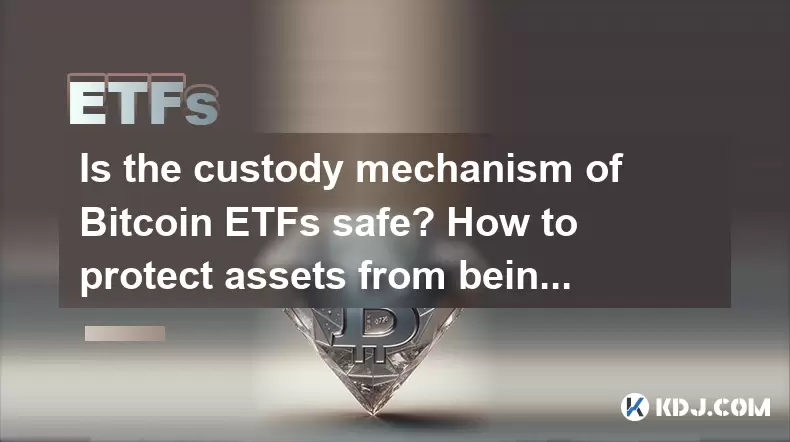
Understanding the Custody Mechanism of Bitcoin ETFs
Bitcoin Exchange-Traded Funds (ETFs) have gained significant traction as a mainstream investment vehicle for institutional and retail investors alike. A critical component of these financial products is the custody mechanism, which ensures that the underlying Bitcoin assets are stored securely. Unlike traditional ETFs that hold stocks or bonds, Bitcoin ETFs must manage digital assets in a way that mitigates risks such as hacking, fraud, and mismanagement.
The custody model typically involves third-party custodians who specialize in securing cryptocurrencies. These institutions employ advanced security protocols, including cold storage solutions, multi-signature wallets, and biometric access controls to protect the private keys that grant access to the Bitcoin reserves backing the ETF shares.
Risks Associated with Bitcoin ETF Custody
Despite the robust infrastructure, several risks remain inherent to the custody of Bitcoin within ETF structures. One major concern is centralization risk, where a single point of failure could lead to massive losses if the custodian is compromised. Historical incidents involving cryptocurrency exchanges being hacked underscore the importance of selecting highly reputable custodians.
Another risk pertains to regulatory uncertainty. The legal framework surrounding digital asset custody is still evolving, and regulatory changes could impact how custodians operate. Additionally, operational errors—such as mismanagement of private keys or inadequate internal audits—can expose funds to theft or unauthorized transfers.
Investors should also be wary of counterparty risks, especially when the custodian is affiliated with other financial entities that may face insolvency or reputational damage. Therefore, it's essential to understand the custodial structure before investing in any Bitcoin ETF.
Security Measures Employed by Custodians
To mitigate the aforementioned risks, leading custodians implement a multi-layered security architecture designed to safeguard digital assets effectively. One of the most common practices is the use of air-gapped cold storage, where private keys are kept offline and away from potential cyber threats. This method significantly reduces the chances of unauthorized access.
In addition to cold storage, many custodians utilize multi-signature technology, requiring multiple approvals before any transaction can be executed. This decentralized authorization process adds an extra layer of protection against both external attacks and insider threats.
Some custodians also integrate hardware security modules (HSMs), which provide tamper-proof environments for key generation and signing processes. Furthermore, regular third-party audits and insurance coverage are standard features offered by top-tier custodians to instill investor confidence and ensure transparency.
How Investors Can Protect Their Assets
While custodians play a crucial role in securing Bitcoin ETFs, individual investors also bear responsibility for protecting their investments. One of the first steps is to conduct thorough due diligence on the ETF provider and its associated custodian. Reviewing the custodian’s track record, security certifications, and insurance policies can help assess the level of protection offered.
Investors should also consider diversifying across different ETFs and custodians to avoid overexposure to a single entity. Diversification helps spread risk and minimizes the impact of a potential breach at any one custodian.
Moreover, staying informed about the governance policies of the ETF and the custodian’s incident response procedures is vital. Understanding what happens in the event of a hack or system failure enables investors to make more informed decisions and take appropriate actions if necessary.
Best Practices for Secure Investment in Bitcoin ETFs
Adopting best practices can further enhance the safety of assets invested in Bitcoin ETFs. One effective strategy is to monitor account activity regularly through the brokerage platform. Any unusual transactions or discrepancies should be reported immediately to the service provider.
Using platforms that offer two-factor authentication (2FA) for accessing ETF holdings adds another barrier against unauthorized access. Additionally, enabling alerts for large withdrawals or suspicious activities allows investors to respond quickly to potential threats.
It’s also advisable to invest only through regulated brokers and platforms that comply with industry standards such as SOC 2 Type II certification or ISO 27001 compliance. These certifications indicate that the platform follows rigorous information security management practices.
Lastly, maintaining offline records of all investment details—including confirmation emails, transaction receipts, and ETF prospectuses—ensures that investors have a reliable backup in case of technical issues or disputes.
Frequently Asked Questions
- Can I personally control the Bitcoin held in an ETF?
No, investors do not have direct control over the Bitcoin stored by the custodian. Ownership is represented through shares in the ETF, and redemption mechanisms are typically reserved for authorized participants. - What happens to my investment if the custodian goes bankrupt?
In the event of custodian insolvency, the assets under custody are generally segregated from the custodian’s own balance sheet. However, recovery may depend on legal proceedings and jurisdiction-specific protections. - Are all Bitcoin ETF custodians insured?
Not all custodians offer insurance, but reputable ones often provide coverage against theft or loss. Investors should verify whether the custodian has adequate insurance policies in place. - How can I check the security credentials of a custodian?
You can review publicly available reports, audit results, and compliance certifications provided by the custodian. Additionally, reaching out to the ETF issuer for detailed security documentation is recommended.
Disclaimer:info@kdj.com
The information provided is not trading advice. kdj.com does not assume any responsibility for any investments made based on the information provided in this article. Cryptocurrencies are highly volatile and it is highly recommended that you invest with caution after thorough research!
If you believe that the content used on this website infringes your copyright, please contact us immediately (info@kdj.com) and we will delete it promptly.
- Ethereum's Rocky Climb: Analysts Eye New ATH Despite Recent Dip
- 2025-08-02 10:30:11
- Ethereum Price, ETF Inflows, and ETH Tokens: What's Driving the Market?
- 2025-08-02 10:50:12
- Ethereum, ADA, and Price Support: What's Next for These Crypto Titans?
- 2025-08-02 10:50:12
- XRP, Ripple, and Transfers: Decoding the Latest Moves
- 2025-08-02 11:10:12
- Injective (INJ) Price Analysis: Breakout or Breakdown?
- 2025-08-02 10:55:35
- Cardano Price, Pi Network, and Crypto Presales: What's the Buzz?
- 2025-08-02 08:50:12
Related knowledge
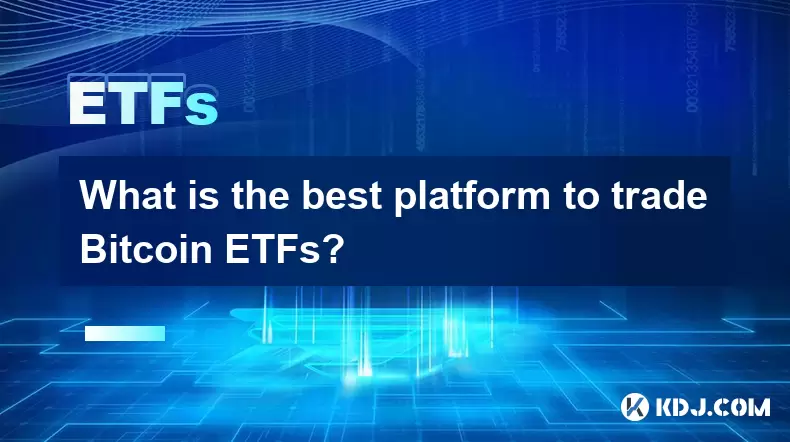
What is the best platform to trade Bitcoin ETFs?
Jul 23,2025 at 04:14am
Understanding Bitcoin ETFs and Their Role in TradingBitcoin Exchange-Traded Funds (ETFs) have gained significant traction among traditional and crypto...
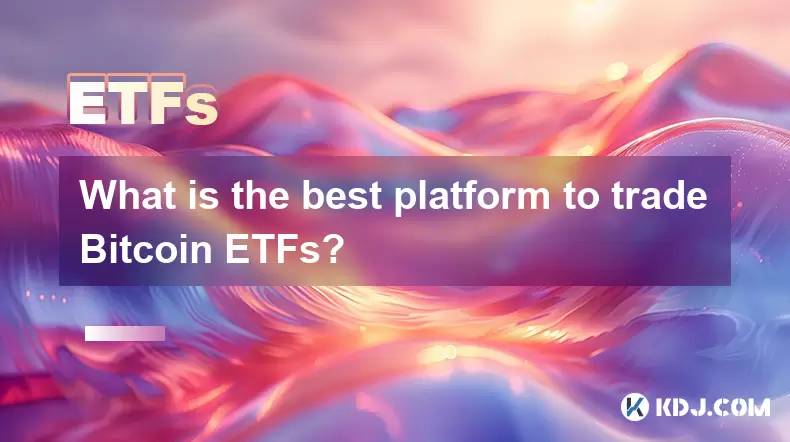
What is the best platform to trade Bitcoin ETFs?
Jul 17,2025 at 03:50pm
Understanding Bitcoin ETFs and Their Role in the MarketBitcoin Exchange-Traded Funds (ETFs) are investment vehicles that track the price of Bitcoin wi...
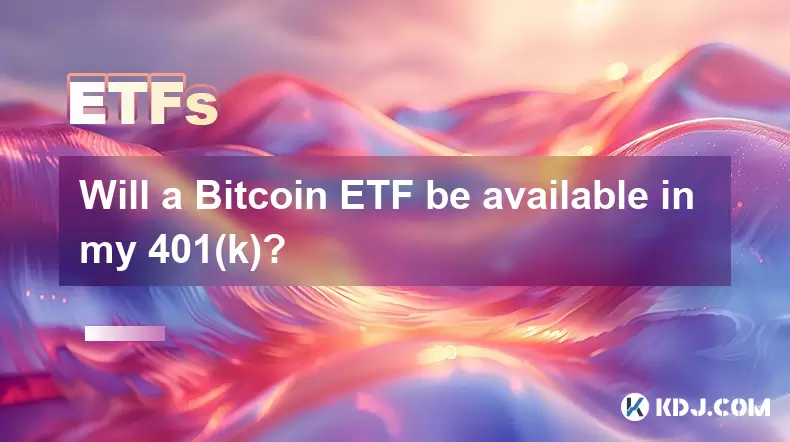
Will a Bitcoin ETF be available in my 401(k)?
Jul 17,2025 at 10:42pm
What is a Bitcoin ETF?A Bitcoin ETF (Exchange-Traded Fund) is an investment vehicle that tracks the price of Bitcoin without requiring investors to di...
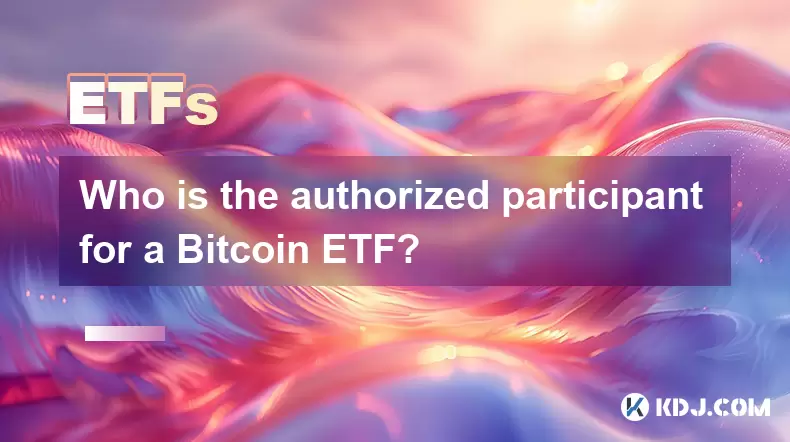
Who is the authorized participant for a Bitcoin ETF?
Jul 18,2025 at 12:42am
Understanding the Role of Authorized Participants in Bitcoin ETFsIn the context of Bitcoin Exchange-Traded Funds (ETFs), an authorized participant (AP...
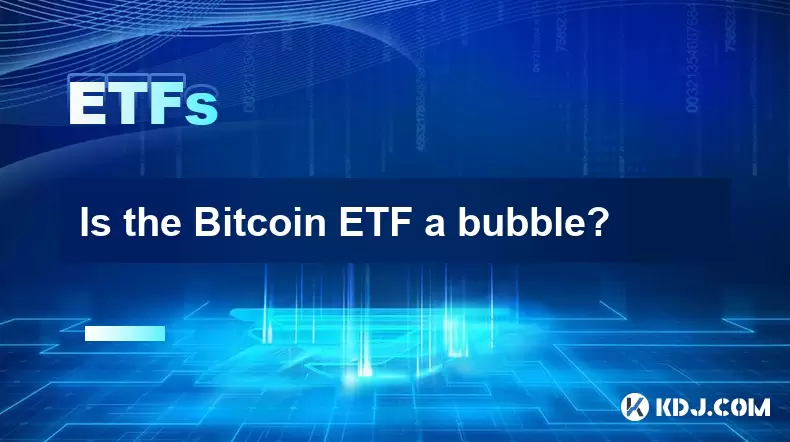
Is the Bitcoin ETF a bubble?
Jul 20,2025 at 06:57am
Understanding the Bitcoin ETF ConceptA Bitcoin Exchange-Traded Fund (ETF) is a financial product that aims to track the price of Bitcoin without requi...
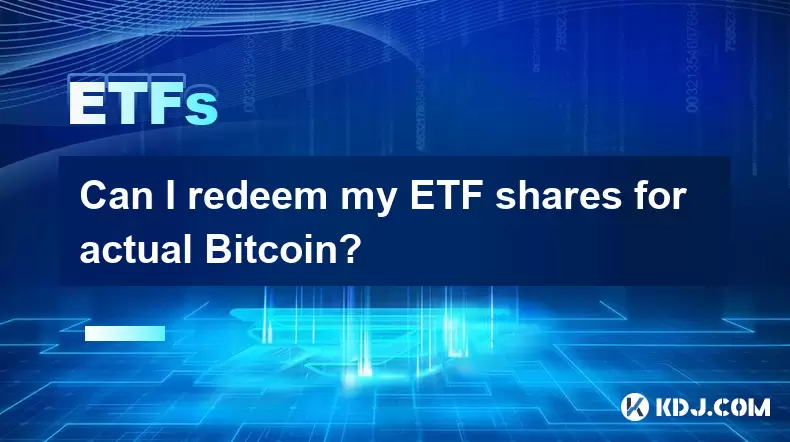
Can I redeem my ETF shares for actual Bitcoin?
Jul 17,2025 at 03:14pm
Understanding ETF Shares and Their Relation to BitcoinExchange-Traded Funds (ETFs) have become a popular investment vehicle for those looking to gain ...

What is the best platform to trade Bitcoin ETFs?
Jul 23,2025 at 04:14am
Understanding Bitcoin ETFs and Their Role in TradingBitcoin Exchange-Traded Funds (ETFs) have gained significant traction among traditional and crypto...

What is the best platform to trade Bitcoin ETFs?
Jul 17,2025 at 03:50pm
Understanding Bitcoin ETFs and Their Role in the MarketBitcoin Exchange-Traded Funds (ETFs) are investment vehicles that track the price of Bitcoin wi...

Will a Bitcoin ETF be available in my 401(k)?
Jul 17,2025 at 10:42pm
What is a Bitcoin ETF?A Bitcoin ETF (Exchange-Traded Fund) is an investment vehicle that tracks the price of Bitcoin without requiring investors to di...

Who is the authorized participant for a Bitcoin ETF?
Jul 18,2025 at 12:42am
Understanding the Role of Authorized Participants in Bitcoin ETFsIn the context of Bitcoin Exchange-Traded Funds (ETFs), an authorized participant (AP...

Is the Bitcoin ETF a bubble?
Jul 20,2025 at 06:57am
Understanding the Bitcoin ETF ConceptA Bitcoin Exchange-Traded Fund (ETF) is a financial product that aims to track the price of Bitcoin without requi...

Can I redeem my ETF shares for actual Bitcoin?
Jul 17,2025 at 03:14pm
Understanding ETF Shares and Their Relation to BitcoinExchange-Traded Funds (ETFs) have become a popular investment vehicle for those looking to gain ...
See all articles

























































































